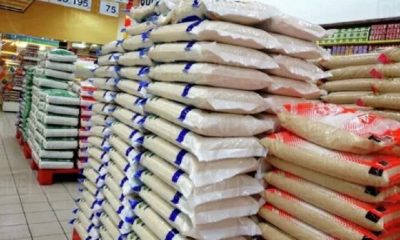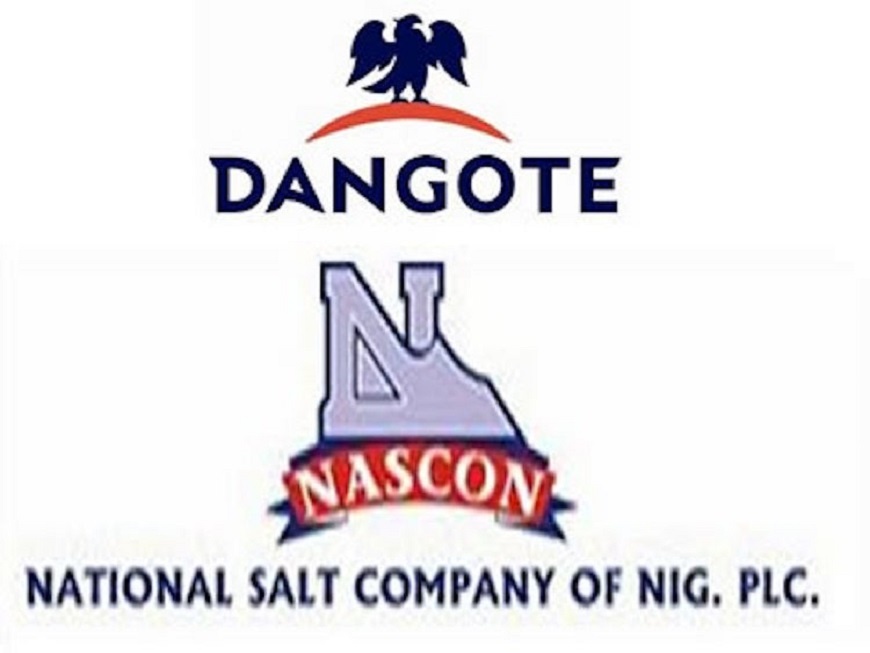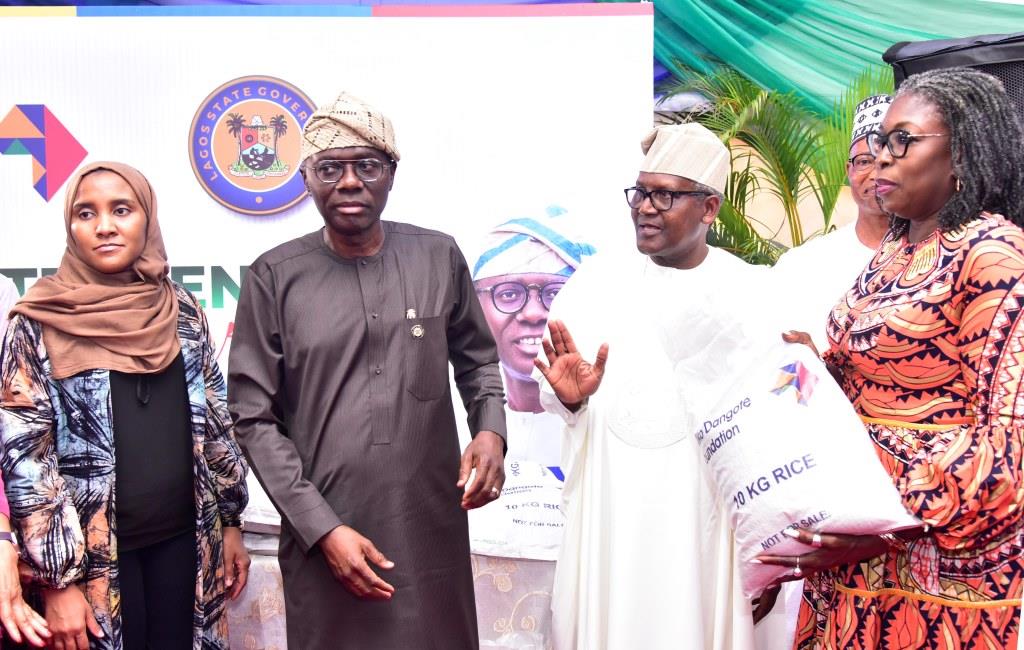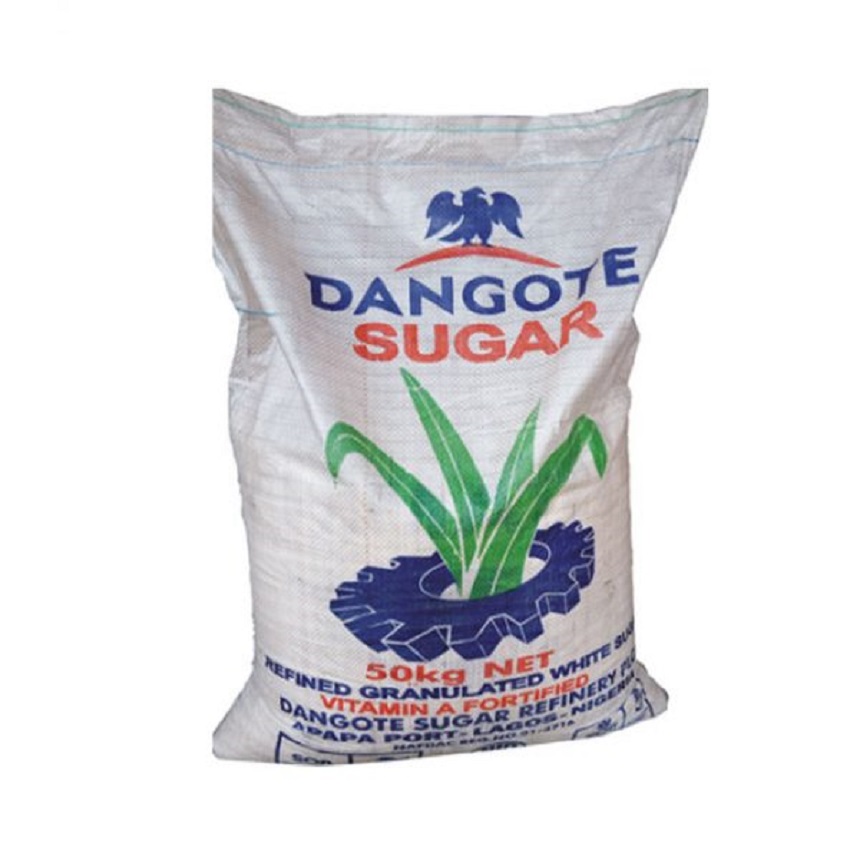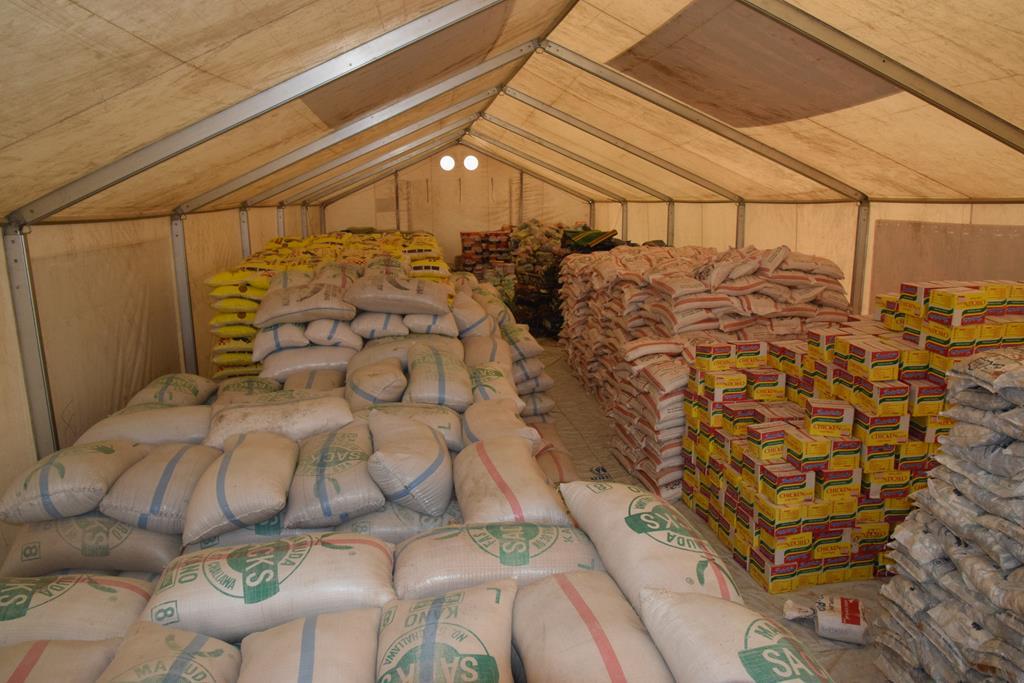Economy
Dangote Vows to End Rice Importation in Nigeria
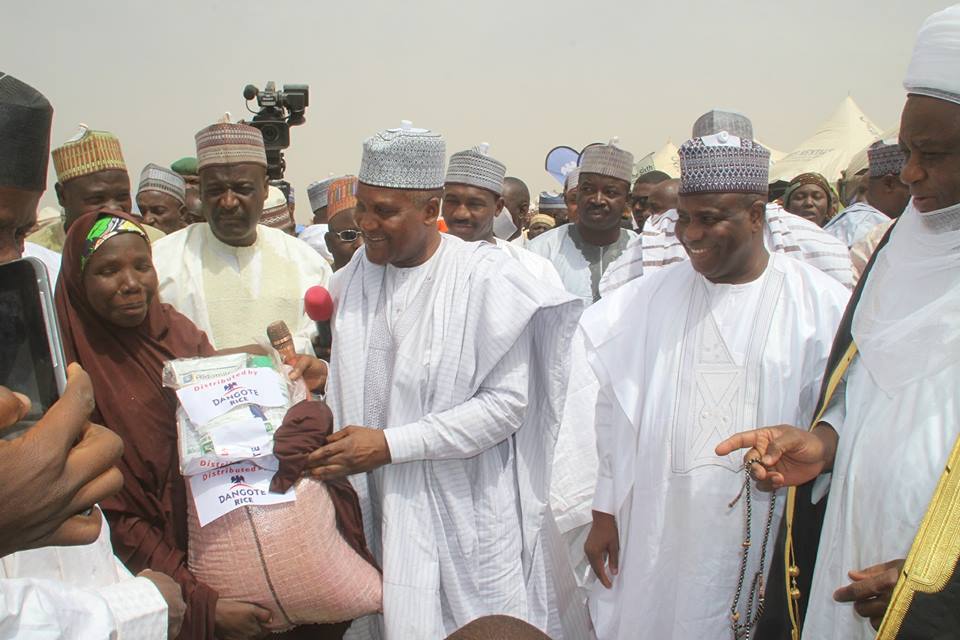
By Dipo Olowookere
Rice is a staple food consumed by many Nigerians, but it is unfortunate that the country relies on importation of the commodity to meet local demands.
However, Africa’s richest man, Mr Aliko Dangote, is determined to ensure rice importation in Nigeria becomes a thing of the past.
This he is doing by aggressively investing in the rice sector and on Wednesday, Mr Dangote laid a foundation stone for the construction of a multi-billion Naira rice processing mill in Hadin, Jigawa State.
This is part of the business mogul’s Rice Outgrower Scheme in Jigawa State and the mill has the capacity to process 16 metric tons of paddy rice per hour when completed.
The plant will also in one year process paddy rice worth N14 billion bought directly from the famers in Jigawa at market rate.
Speaking at the ground breaking ceremony in Hadin, Kaugama local government area, Mr Dangote explained that the commencement of the construction of the integrated rice processing plant was the culmination of series of events which began with the signing of a $1 billion agreement with the federal government for the integrated rice production in Kebbi, Sokoto, Zamfara, Kano, Niger and Jigawa States.
“We have continued to pioneer new approaches to empowering our primary stakeholders and our farmers, through the Dangote outgrowers programme thereby creating thousands of jobs, increasing incomes, poverty reduction in rural communities by providing high quality agro-inputs, technical support and secured market for farmers.
“Also, creating access to finance, mechanization and irrigation services so as to enhance agricultural productivity,” he stated.
Recalling that the Dangote Rice limited started the outgrowers scheme in 2016 with thousands of hectares of land in Hadejia, Jigawa state, creating over 10,000 jobs (direct and indirect) to farmers, the business mogul said with the new ultra-modern mill enough paddy rice will be grown and harvested for processing.
According to him, the mill which will take only months for installation and commissioning is the first in the series of five other mills coming up in Kano, Sokoto, Zamfara, Kebbi and Niger States in the first phase, while in the second phase, other mills will be built in Nasarawa, Kogi, and other states.
“When these planned six mills come fully on stream, we will achieve a capacity of seven hundred thousand metric tons per annum of Parboiled rice, which will make Dangote Rice the largest rice producer in Africa and will make a bold step in making Nigeria self-sufficient in Rice production, stop importation Nduka save the nation foreign exchange,” Mr Dangote said.
The industrialist stated further that towards co-creating value for all stakeholders, the company has engaged about 20,000 out growers who are expected to produce an average of 180,000 tons of paddy rice on about 30,000 hectares of land. “We are focused on engaging in the region of 300,000 farmers in the next 12 months when our rice mills are all functional and we achieve steady state.”
“We will continue to launch massive agricultural projects across the country in rice and dairy farming. Our push for backward integration in providing our own raw materials on a massive scale has led to the planned investment of $4.6 billion over the next three years in sugar, rice and dairy production alone. That will eliminate the country’s reliance on imported materials, and the foreign exchange headaches that come with it,” he said.
In his opening remarks, the Dangote Group Executive Director, Mr Devakumar Edwin, explained that the Dangote Rice team has been involved in scaling up the outgrower operations to at least 5,000 hectares this season and this will very soon increase and grow to over 15,000 hectares cultivated per cycle or season to fully optimise operations.
He said the establishment of a multi-billion Naira state-of-the-art integrated rice processing facility to process at least 260 metric tons of rice paddy per day grown which is produced from thousands of local rice out growers within Jigawa State is a giant step forward and expresses his company’s confidence and faith in local farmers to continuously stand with Dangote to make this project a success.
Located on 25 hectares site in Hadin, Mr Edwin noted that the mill is earmarked to begin operations in the last quarter of 2018. “During the construction phase and when it becomes fully operational, hundreds of employment opportunities will be created, knowledge transference and skills developed among our teeming youthful population thereby boosting local economy.”
According to him, “the Jigawa famers are in for a good times as the 125,000 metric tons of paddy rice that this plant requires for processing will be brought from the farmers of Jigawa for an estimated purchase price of N14 billion per annum. This is a huge benefit for the farmers in Jigawa.
“This mill will be producing high quality parboiled rice that competes with the best in the world this is in-line with our continuous aim to touch the lives of millions who believe in the Dangote brand.”
“Jigawa State is endowed and blessed with vast fertile land, water resources, climate and progressive people, as well as one of the fastest growing agricultural destinations in Nigeria, was identified as an ideal location for us to set up our first facility in Nigeria. This obviously reinforces our commitment to supporting the efforts of the present administration in developing a robust agro-industry in Nigeria.
“We made commitment to Nigerians that we will produce 1 million metric ton of quality parboiled rice. Since then we have embarked on several initiatives towards achieving this objective with support and collaboration from state and federal government agencies, ministries and departments, non-governmental organisations, community based organisations, traditional and financial institutions, etc., we continue to pioneer new approaches to empowering our primary stakeholders and our farmers, through the Dangote outgrower program thereby creating thousands of jobs, increasing incomes, poverty reduction in rural communities by providing high quality agro-inputs, technical support and secured market for farmers.”
On his part, Governor of Jigawa State, Mr Abubakar Badaru, expressed delight at the stage of the Dangote Rice project in the state saying it was in line with the vision of the Invest Jigawa, an organ set up to accelerate investments in the state.
He said Jigawa is one of the States reputed to be on top on ease of doing business in Nigeria saying the Dangote Rice presence in the state is a pointer to the fact. He added that the state is also in the forefront of the diversification efforts of the federal government from oil to non-oil ventures especially agriculture.
The Governor promised that the state will be willing to do whatever it will take to ensure the Dangote rice operate smoothly to the satisfaction of all parties in the state.
Economy
LIRS Urges Taxpayers to File Annual Returns Ahead of Deadline

By Modupe Gbadeyanka
All individual taxpayers in Lagos State have been advised to file their annual tax returns ahead of the March 31 deadline.
This appeal was made by the Lagos State Internal Revenue Service (LIRS) in a statement issued by its Head of Corporate Communications, Mrs Monsurat Amasa-Oyelude.
The notice quoted the chairman of LIRS, Mr Ayodele Subair, as saying that timely filing remains both a constitutional and statutory obligation as well as a civic responsibility.
The statutory filing requirement applies to all taxable persons, including self-employed individuals, business owners, professionals, persons in the informal sector, and employees under the Pay-As-You-Earn (PAYE) scheme.
In accordance with Section 24(f) of the 1999 Constitution of the Federal Republic of Nigeria, Sections 13 &14(3) of the Nigeria Tax Administration Act 2025 (NTAA), every individual with taxable income is required to submit a true and correct return of total income from all sources for the preceding year (January 1 to December 31, 2025) within 90 days of the commencement of a new assessment year.
“Filing of annual tax returns is not optional. It is a legal requirement under the Nigeria Tax Administration Act 2025. We encourage all Lagos residents earning taxable income to file early and accurately.
“Early and accurate filing not only ensures full adherence with statutory requirements, but supports effective monitoring and forecasting, which are critical to Lagos State’s fiscal planning and long-term sustainability,” Mr Subair stated.
He further noted that failure to file returns by the statutory deadline attracts administrative penalties, interest, and other enforcement measures as prescribed by law.
To enhance convenience and efficiency, all individual tax returns must be submitted electronically via the LIRS eTax portal at https://etax.lirs.net. The platform enables taxpayers to register, file returns, upload supporting documents, and manage their tax profiles securely from anywhere.
In keeping with global best practices, Mr Subair reiterated that LIRS continues to prioritise digital tax administration and taxpayer support services. He affirmed that the LIRS eTax platform is secure and accessible worldwide. Taxpayers requiring assistance may visit any of the LIRS offices or other channels.
Economy
NNPC Targets 230% LPG Supply Surge to 5MTPA Under Gas Master Plan 2026

By Adedapo Adesanya
The Nigerian National Petroleum Company (NNPC) Limited has said the Gas Master Plan 2026 targets over 230 per cent scale-up of Liquefied Petroleum Gas (LPG) supply from 1.5 million tonnes per annum (MTPA) to 5 MTPA this year.
The Executive Vice President for Gas, Power and New Energy at NNPC, Mr Olalekan Ogunleye, unveiled the strategic direction of the NNPC Gas Master Plan 2026, outlining an aggressive expansion drive to position Nigeria as a regional and global gas powerhouse.
Mr Ogunleye delivered the keynote address at the 2026 Lagos Energy Week, organised by the Society of Petroleum Engineers (SPE), where he detailed plans to accelerate gas development, deepen infrastructure and significantly scale domestic supply.
According to him, the Gas Master Plan targets a scale-up of LPG or cooking gas supply from 1.5 MTPA to 5 MTPA, alongside expanded feedstock for Mini-LNG and Compressed Natural Gas (CNG) projects.
“The NNPC Gas Master Plan 2026 is a blueprint to unlock Nigeria’s vast gas potential and translate it into tangible economic value,” Mr Ogunleye said.
He added that the strategy would also drive exponential growth in Gas-Based Industries, GBIs, strengthening local manufacturing, fertiliser production and power generation.
“Our renewed focus is on turning abundant gas resources into inclusive economic growth and improved quality of life for Nigerians,” he stated.
Mr Ogunleye said the plan aligns with the Federal Government’s Decade of Gas initiative and the presidential production targets of achieving 10 billion cubic feet per day by 2027 and 12 BCF/D by 2030.
Industry leaders at the event, including executives from Chevron Corporation, Esso Exploration and Production Nigeria Limited, Midwestern Oil and Gas Company Limited, Abuja Gas Processing Company and Shell Nigeria Gas, commended the plan and praised Ogunleye’s leadership in driving implementation excellence.
The new blueprint signals NNPC’s determination to anchor Nigeria’s energy transition on gas, leveraging infrastructure expansion and domestic utilisation to consolidate the country’s status as Africa’s largest gas reserve holder.
Economy
Shettima Blames CBN’s FX Intervention for Naira Depreciation

By Adedapo Adesanya
Vice President Kashim Shettima has attributed the Naira’s recent depreciation to the intervention of the Central Bank of Nigeria (CBN) in the foreign exchange (FX) market, stating that the currency could have strengthened to around N1,000 per Dollar within weeks if the apex bank had allowed market forces to prevail.
The local currency has dropped over N8.37 on the Dollar in the last week, as it closed at N1,355.37/$1 on Tuesday at the Nigerian Autonomous Foreign Exchange Market (NAFEM), after it went on a spree late last month and into the early weeks of February.
However, speaking on Tuesday at the Progressive Governors’ Forum (PGF), Renewed Hope Ambassadors Strategic Summit in Abuja, the Nigerian VP said the intervention was to ensure stability.
“In fact, if not for the interventions by the Central Bank of Nigeria yesterday, the 1,000 Naira to a Dollar we are going to attain in weeks, not in months. But for the purpose of market stability, the CBN generously intervened yesterday.
“So, for some of my friends, especially one of our party leaders who takes delight in stockpiling dollars, it is a wake-up call,” the vice president said.
He was alluding to CBN buying US Dollars from the market to slow down the rapid rise of the Naira.
Latest information showed that last week, the apex bank bought about $189.80 million to reduce excess Dollar supply and control how fast the Naira was gaining value.
The move was aimed at preventing foreign portfolio investors from exiting Nigeria’s fixed-income market, as large-scale sell-offs could heighten demand for US Dollars, intensify capital flight, and exert further pressure on the exchange rate.
Amid this, speaking after the 304th meeting of the monetary policy committee (MPC) of the CBN on Tuesday, Governor of the central bank, Mr Yemi Cardoso, said Nigeria’s gross external reserves have risen to $50.45 billion, the highest level in 13 years.
This strengthens the country’s foreign exchange buffers, enhances the apex bank’s capacity to defend the Naira when needed, and boosts investor confidence in the stability of the Nigerian FX market.
-

 Feature/OPED6 years ago
Feature/OPED6 years agoDavos was Different this year
-
Travel/Tourism10 years ago
Lagos Seals Western Lodge Hotel In Ikorodu
-

 Showbiz3 years ago
Showbiz3 years agoEstranged Lover Releases Videos of Empress Njamah Bathing
-

 Banking8 years ago
Banking8 years agoSort Codes of GTBank Branches in Nigeria
-

 Economy3 years ago
Economy3 years agoSubsidy Removal: CNG at N130 Per Litre Cheaper Than Petrol—IPMAN
-

 Banking3 years ago
Banking3 years agoSort Codes of UBA Branches in Nigeria
-

 Banking3 years ago
Banking3 years agoFirst Bank Announces Planned Downtime
-

 Sports3 years ago
Sports3 years agoHighest Paid Nigerian Footballer – How Much Do Nigerian Footballers Earn


